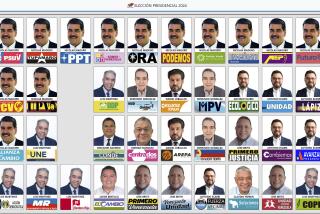Voters in Iran Amazed They’ve Got Real Choice
- Share via
TEHRAN — As Iranians prepare to cast ballots today in the closest-fought presidential election in the Islamic republic’s 18-year history, voters here find themselves in a quandary. Their system walks like democracy. It talks like democracy. But could it really be a democracy?
More than a few voters seem slightly incredulous to be presented with a clear choice, and an exciting race, over who will succeed President Hashemi Rafsanjani when he vacates office at the end of his second four-year term of office, the most allowed under Iran’s Constitution.
Until recently, Parliament Speaker Ali Akbar Nateq-Nuri, known for his conservative, anti-Western views, was regarded as president-in-waiting, his actual election a mere formality.
That was until a disparate coalition of technocrats and leftists searched for a candidate to stop Nateq-Nuri and found one in Mohammad Khatami, a former minister of culture and Islamic guidance.
Khatami’s 2-month-old campaign has caught fire, and the traditionalist clergy who hold sway in Iran show signs of being worried.
One joke here goes: Heard the latest poll? Seventy percent of the ballots will go to Khatami, and Nateq-Nuri’s chances of victory now stand at 90%.
As the joke suggests, Nateq-Nuri is the favorite of the system, including--many believe--supreme leader Ayatollah Ali Khamenei and the country’s ideological watchdog, the 12-member Council of Guardians.
But Khatami has backers too--in the Islamic left and the moderate, technocratic faction known as the Servants of Construction.
Any sampling of opinion on the placard-festooned streets of Tehran quickly reveals that he is the choice of at least a large chunk of ordinary Iranians. At campaign meetings, meanwhile, he garners near-hysterical adulation.
“Our president is Khatami!” thousands of delirious young men chanted at the packed Jame Mosque in southeast Tehran on Wednesday evening, waving pictures of their idol, then breaking down plate-glass windows to follow him when he departed.
Afterward, Mohammed Mohamedi, a government worker watching the scene, observed: “I can see for him the same feeling that people had for [Ayatollah Ruhollah] Khomeini.”
A big unknown, however, is whether the obvious enthusiasm for Khatami in the capital extends to smaller cities and rural areas.
Clearly, Khatami’s candidacy has caught hold in the capital among the young. They see a vote for him as their chance to protest Iran’s “hierarch-cracy” and send a message that they want better economic conditions and human rights, said Ibrahim Yazdi, head of the Freedom Party. He was among 234 candidates barred from running for president by the Council of Guardians.
The mullahs’ rejection on ideological or religious grounds of all but four presidential hopefuls is one factor that makes the Iranian system not fully democratic, diplomats here say. Another is the lack of openness; no poll watchers are allowed in to oversee the vote tally, nor are international observers on hand to verify fairness of procedures.
And as Khatami’s popularity has blossomed, so too have suggestions that the vote will be manipulated if it does not favor Nateq-Nuri.
“Reactionary elements of the regime will not abide by the electoral process and will have the results annulled,” predicted Dariush Frouhar, a former labor minister who has become an anti-government activist.
Authorities have denounced such suggestions as baseless slander. Khamenei on Wednesday guaranteed Iran’s electoral integrity, saying he regards every candidate now in the race as qualified.
“I won’t allow the election to be unhealthy,” he pledged.
There were hints, though, that some in power have been tilting toward Nateq-Nuri.
In the campaign’s last days, Khatami’s national headquarters was ordered to move because of a legal technicality, and he was blocked from holding an election meeting in a sports stadium.
Today’s vote comes at a sensitive time for Iran’s leaders. The nation has been at peace for almost a decade after a devastating eight-year war with Iraq.
Iranians are now daring to be more critical of life in an inflation-racked economy and impatient with religious strictures on everyday life; 75% of the population is younger than 25--too young to remember the hows and whys of the ousting of the late shah.
To them, Nateq-Nuri is the status quo, Khatami is change.
An outsider, though, might ask--why the fuss? After all, both men are bearded, turbaned mullahs, educated at the theological seminary in Qom. Both are sworn to uphold Iran’s hard-line foreign policies. Both promise to continue economic and development programs begun under Rafsanjani.
But the people can discern differences, and most interviewed seemed elated to have a choice to make.
As petrochemical worker Mansour Atabki put it: “One hundred percent sure, this is our most important election since the revolution.”
More to Read
Sign up for Essential California
The most important California stories and recommendations in your inbox every morning.
You may occasionally receive promotional content from the Los Angeles Times.










